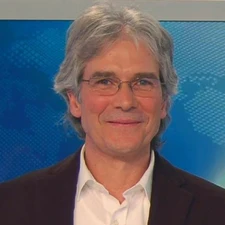Jean-Pierre Gattuso

The 2012 Vladimir Ivanovich Vernadsky Medal is awarded to Jean-Pierre Gattuso for creative and scholarly contributions to biogeosciences at the interface between microbial ecology, coral ecology, biogeochemistry and chemical oceanography.
Jean-Pierre Gattuso is a CNRS Senior Research Scientist (Directeur de recherche de 1ère classe) at the Laboratoire d’Océanographie de Villefranche-Sur-Mer (France). Jean-Pierre Gattuso started his studies in Biological Oceanography at the University of Aix-Marseille II, where he received his BSc, MSc, and PhD degrees. After a reader position at the University of Nice he spent three years as a postdoctoral research scientist at the Australian Institute for Marine Science. In 1990, he entered a position as CNRS research scientist at the Laboratory EPHE/Marine Biology, in Perpignan. Only three years later, Gattuso moved to Monaco to become program leader at the Observatoire Océanologique Européen. In 1994 he finished his habilitation in Biological Oceanography at the University of Nice. From 1998 until 2004 he was leading the research group ‘Diversity, Biogeochemistry and Microbial Ecology’ at the French Laboratoire d’Océanographie in Villefranche-sur-mer, from 2005 on he is acting here as a CNRS Senior Research Scientist. In the years 2004 and 2005, Gattuso went as a visiting scientist to the Rutgers University and the National Center for Atmospheric Research, and between 2006 and 2011 he served as a research professor at the Marine Biology Institute at the Shantou University in China. Among several affiliations to scientific societies and numerous community services, Gattuso is a member of the European Geosciences Union and one of the two founding editors of the EGU journal Biogeosciences.
The research performed by Gattuso is very interdisciplinary. His early work on coral functioning and physiology and coral community metabolism had a major impact on the research field. He systematically unravelled carbon flows within coral communities; i.e. he documented how and to what extent the organic and inorganic carbon cycles were linked. This work basically settled the discussion whether pristine corals are carbon dioxide sources or sinks and how this may change upon eutrophication. Gattuso has also made major contributions to document and identify the factors governing ecosystem metabolism in coastal areas. He provided one of the first global assessments of coastal ecosystem metabolism and published the first paper on benthic primary production in the global ocean, an underappreciated and understudied topic. His most important contributions to scientific progress are related to ocean acidification and its effect on organisms, communities and ecosystems. The scientific approaches combine laboratory with field work in natural settings ranging from the Red Sea to the Arctic Ocean and Alpine lakes, and include even software development. He has trained numerous masters and PhD students, and Postdocs. The research of Gattuso and his co-workers has resulted in numerous publications in key journals and led to a better understanding in the interdisciplinary scientific fields. The interdisciplinarity and internationality of his research and the combination of multiple approaches to solve the important open questions in the carbon cycle are in the sense of Vladimir I. Vernadsky’s scientific work.
Besides other community services, Gattuso was Founding President of the Biogeosciences division of the European Geosciences Union, is co-ordinator of the EU project on Ocean Acidification (EPOCA), and he serves on many international panels and boards that co-ordinate and direct global research on the marine carbon cycle. All these powerful efforts were driven by his strong dedication to foster biogeosciences. The Vladimir Ivanovich Vernadsky medal committee has nominated Gattuso for his important contributions to biogeosciences, in particular at the interface between microbial ecology, coral and coastal ecology, biogeochemistry and chemical oceanography. He has been and is an enormously active driver in the biogeoscience world, serving through scholar- and mentorship, innovation, and community outreach.
